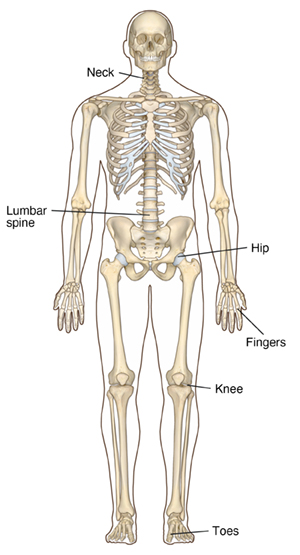A
B
C
D
E
F
G
H
I
J
K
L
M
N
O
P
Q
R
S
T
U
V
W
X
Y
Z
Topic IndexLibrary Index
Click a letter to see a list of conditions beginning with that letter.
Click 'Topic Index' to return to the index for the current topic.
Click 'Library Index' to return to the listing of all topics.
Osteoarthritis: Common Sites
Osteoarthritis (OA) is sometimes called degenerative joint disease or wear-and-tear arthritis. It's the most common type of arthritis. Cartilage covers the ends of bones and acts as a cushion. In OA, the cartilage wears away. If enough cartilage wears away, bone rubs against bone. The joint changes in OA cause pain, stiffness, and trouble moving. OA may occur in any joint. But those most commonly affected are the spine, neck, hips, knees, fingers, and toes.

Neck
Joints and cartilage between small bones in the neck may wear away. Pain may travel to the shoulder or the base of the skull or down the arms.
Lumbar spine
Bony spurs may form on the joints between the vertebrae (spinal bones), or disks (cushions of cartilage between vertebrae) may wear down. Pain may affect the lower back and travel down the leg (sciatic pain).
Hip
Cartilage damage can occur in the large “ball and socket” joint that connects the pelvis and thighbone (femur). Pain may travel to the groin, buttocks, or knee.
Knee
The cartilage in the knee joint may wear down. Weakness or instability in the knee joint may make walking or climbing stairs difficult.
Fingers
Finger joints may become enlarged and knobby. Grasping objects may be hard, especially if the joint at the base of the thumb is affected.
Toes
Toes may be affected. Arthritis may cause a bunion, a bump at the base of the big toe. Standing or walking may be painful. Pain may also occur if the cartilage in the toe joint wears down. This is most common in the big toe.
Online Medical Reviewer:
Marianne Fraser MSN RN
Online Medical Reviewer:
Rajadurai Samnishanth
Online Medical Reviewer:
Rita Sather RN
Date Last Reviewed:
9/1/2024
© 2000-2024 The StayWell Company, LLC. All rights reserved. This information is not intended as a substitute for professional medical care. Always follow your healthcare professional's instructions.